Since 2010, the institutional system of political propaganda in Hungary has been gradually developed. The Media Act, the regulation of the media market, the placing of public service media essentially under government control, the organisation of almost half a thousand editorial offices (KESMA) into one company to meet government needs, the government subsidies of hundreds of billions of forints to public service and private newspapers, the nationwide billboard campaigns, the national consultations, all these together could be a very dangerous weapon against the free formation of opinion. Measurements show that this media arsenal, when operated in a coordinated way, while it can be used to disseminate true information, can also be used to spread disproved, i.e. false, or misleading news, and thus to change the perception of a large part of public opinion, for example, about the state of the country or a particular issue, in line with the aims of political propaganda. The Political Propaganda Indicator measures the proportion of the population that accepts or adopts a position based on unverifiable or clearly refuted claims as a result of campaigns.
Similar studies were carried out by several institutions in late October and mid-November 2022. The most revealing figure is that 36% of those surveyed said strongly that the Hungarian government did not vote for EU sanctions. They said this despite the fact that it had been reported in several places and even the Prime Minister himself said that he had voted for the sanctions in the European Council.1 (Otherwise, they could not have voted for the sanctions, because such a decision could only be taken by full agreement in the European Council.) The figure of more than one third shows the confusion that a campaign based on the slogan "Say no to sanctions" can cause in the minds of people (and not only among government party supporters). This was reported in Political Capital's article "How informed are Hungarians about sanctions?" on 18 November 2022.2
The Political Propaganda Indicator gives an accurate answer to the question of how much confusion a political propaganda campaign can really cause. The research, based on a methodology developed by the Dimension Media Foundation, Závecz Research and the Mérték Media Analysis Workshop, was supported by the National Association of Hungarian Journalists as part of the Dutch Ministry of Foreign Affairs' anti-fake news project. The survey includes data from face-to-face interviews conducted between 14-22 November 2022 on the basis of a representative sample of 1000 people. Respondents were asked to rate the claims made about sanctions. Did you encounter the statement, do you think it is true, do you think it is false, or cannot decide? This is the third survey using this methodology.3 In the days leading up to the 2022 parliamentary elections, we examined the extent to which the propaganda machine serving Viktor Orbán managed to convince voters during the campaign that Péter Márki-Zay would take Hungary to war, as opposed to the Prime Minister, whose main message was: Preserve Hungary's peace and security. Despite Márki-Zay's refutation of the statement attributed to him, and despite his proving that the ominous statement was a sentence taken out of context and stripped of its original meaning, the refutation could not reach the public because the propaganda team (essentially the government) that controls the majority of the media system did not allow it.4
In the spring survey mentioned above, it was shown that one third of those who sympathised with the Alliance list also accepted the Fidesz narrative, i.e. they listened to Fidesz rather than to the candidate representing their own side. What better way to question the impartiality, objectivity, balance and independence of an information system, i.e. its compliance with the rule of law, than to use the tools of political propaganda by one of the competing parties, even by means of fake news, a flood of disinformation, character assassination and misinformation, to win over at least one third of the rival team's supporters, while the rival team has far fewer means to do so.
The latest measurement results, which are in line with previous measurements, show that well-managed political propaganda can help to persuade a significant part of the less informed masses to adopt the position desired by the government. One of the aims of the latest campaign, which is still running, is to make the demonstrably false claim that the Hungarian government did not vote for sanctions, is true. Medián's measurement shows that the campaign was successful with 50% of Fidesz supporters. This result is a forgivable sin in any democracy, as they reflect the message of the party they sympathise with in their statements. However, the operation according to the rule of law is called into question when the possibility of access to information free of manipulation is so limited in the face of a political propaganda campaign that even among supporters of opposition parties, the proportion of those who accept a false claim as true reaches 23 percent of the total population.5 (The opinion of supporters of the Mi Hazánk party has been treated separately because it is difficult to pick out among the messages of Mi Hazánk those that do not coincide with the important messages of the ruling parties.) The Závecz Research survey measured 28 percent in that group.
What are the challenges facing the government today? At the time of writing, at the end of November 2022, during the sanctions referendum campaign, the Hungarian government is still threatened with not receiving Hungary's automatic share of the recovery fund, and EU funds for the budget period '22-27 are frozen until the rule of law conditions are met. The reason for the suspension of payments is that the European Parliament has decided that only those who meet the rule of law criteria can receive the aid. This guidance is being followed by the European Commission. Hungary failed to meet the requirements on many points. In recent months, the Hungarian parliament has passed 17 laws to meet the European Commission's demands to restore the rule of law, for example by setting up a new anti-corruption authority to reduce the risk of corruption. We are very far from the end of this process. And the Hungarian government is in desperate need of EU funds. (Since then, the Commission has announced strict conditions for payments.)
What challenges has the Hungarian government to face? The forint-euro exchange rate, the best indicator of the international credibility of governance, is hitting negative peaks. The euro was 428 forints in mid-October and 411 forints at the end of November. Inflation in Hungary is above 20%, well above the EU average. Energy prices have also risen by several hundred percent. Students are constantly protesting for a pay rise for teachers, but also for the right to strike in the education sector. In a good case, the economy will not be in recession in 2023, but it will not grow either, the deputy governor of the central bank confirmed at a conference for investors.6
Hungary continues to take a different path in the EU's handling of the Russia-Ukraine conflict. Whenever possible, it uses its veto when it has to vote, and its 'no' vote often paralyses decision-making, such as on the minimum tax for multinationals. This "game" is seen in the EU as Hungary blackmailing the EU to open the money traps.
If we look at the whole package, the solution to almost all problems, but most of all to slow down the decline in popularity, is to make people believe that "the EU is to blame for everything". So much so that even teachers' salaries have been said to be up to the EU to raise. If the subsidy is given, there will be money, if not, there will not be.
One of the key turns of the "blame the EU for everything" concept is the introduction of the concept of inflation due to sanctions. Prices are rising because the EU has imposed sanctions on Russia. According to experts - and the facts show - Gazprom raised prices before the war, in preparation for the war.7 The other claim, which is being diligently trumpeted by the media of the political propaganda machine, is that sanctions are a failure, that they hurt the EU more than Russia. The facts, the Commission's letter to Orban, the international publications clearly show that the sanctions have brought down industries in Russia.8, 9
It can only be effectively said that Brussels is to blame for everything if the first of the EU's actions, namely that EU funds are conditional on the rule of law, is left out of the beginning of the political propaganda message. Hungary has not been granted the right to draw down the funds allocated to it because it does not fulfil the rule of law conditions it undertook to respect upon accession. This is the fundamental reason for withholding payments. The national consultation is intended to reframe this situation. The national consultation looks as if it is collecting opinions, but it is essentially a political propaganda campaign to divert attention from the failings of the government, to find an external cause, an external culprit, a scapegoat to explain the crisis.
For almost a decade, Endre Sík has been documenting how political propaganda campaigns can be used to generate threats to the deepest human values of citizens, by demonstrating the model of the moral panic button. Keywords: family, children, ethnic, national, religious, sexual identity, migrant attacks, Soros, war, work, home, existential security, etc. Sík has also shown how easy it is to create a scapegoat to personify socially induced fear, and how the very person who controls the manipulation, the political propaganda machine, can be at the head of the coalition against the scapegoat.10 There is nothing new under the sun, those who have read the volume available in Hungary, Federico Finchelstein, Professor at Harvard University, in his historical summary of Fascist Lies.11
You can call it a moral panic button, a Political Propaganda Centre, whatever, but the point is that manipulation can only be truly effective if the powers that be step outside the rule of law and transform the media system to flood the media space, or at least a significant part of it, with disinformation. Such a media model works like a national brain laundry. A refutation of a piece of fake news, disinformation or political propaganda has at most a fraction of a chance of reaching the same masses that the system, which is otherwise maintained at taxpayers' expense, floods with the products of political propaganda, victimising the unsuspecting voter and at the same time protecting the political support of the party that commissioned it.
In developed democracies, public service media, somewhat independent of the government, or commercial media protected from government influence, have been institutionalised to counterbalance the natural media advantage of the government, to check power, and to reduce the risks of one-sidedness in the information systems run by the government. Their independence is open to criticism, but imperfection is no excuse for organised manipulation.
What do the numbers show? We have looked at what people think about important and controversial news, or news that is demonstrably false but presented by the political propaganda machine, and where they get their information.
At the beginning of the interviews, the interviewees were asked to rank the media they considered most trustworthy, least trustworthy and most trustworthy. From the answers, it is clear that the media close to the government are the most trustworthy. It is clear that political communities live in information bubbles. If these bubbles are large enough, they can be used to effectively influence a significant part of public opinion. It would require a special analysis that the proportion of completely uninterested people, of those who do not want to respond, has never been so high. 46% of all respondents belong to this group, who do not read or are not interested in the news. Those who are more successful than their competitors in disseminating political propaganda are likely to gain a significant advantage in this group.



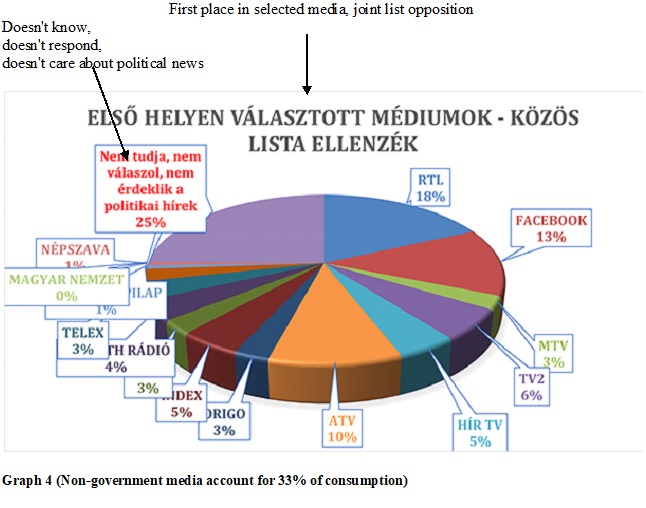
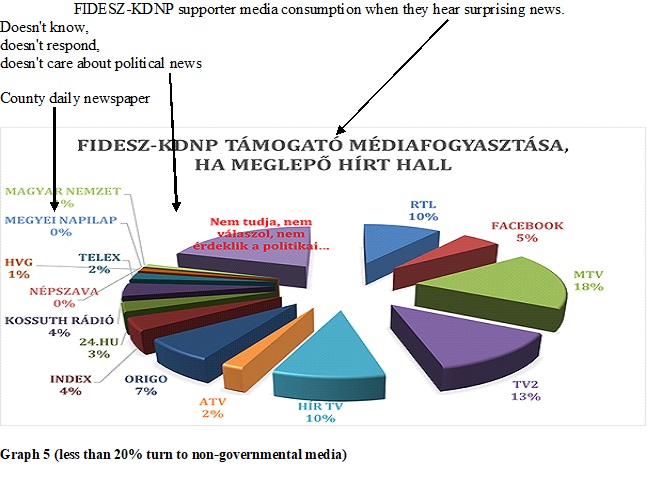
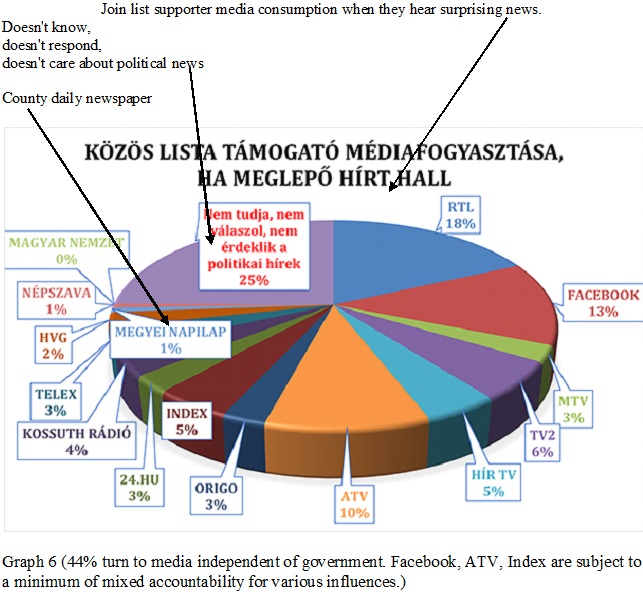
In the PPI survey, the element numbers in the sample are 304 Fidesz-KDNP, 305 supporters of the joint list in the 2022 elections, 62 Mi Hazánk and 291 self-identified non-party supporters. This figure already reflects the significant decline in support for Fidesz-KDNP. It should be noted here that the data should always be compared with the proportion of the total population represented by each intellectual community and political orientation, and within this, its media preference. In order to find out where the citizens sympathetic to the Fidesz-KDNP coalition get most of their information from, we chose to ask them which media they would choose in the first place to check the veracity of the news when they hear something unusual.
Not surprisingly, the leading media in the political propaganda arena are in the top positions: 18 percent MTV, 13 percent TV2, 10 percent Hír TV and 7 percent Origó, 4 percent Kossuth radio. Of these, only 10 percent control the news on RTL, 2 percent on ATV, 2 percent on 24.hu, 2 percent on Telex and 1 percent on HVG. In contrast, the order of those sympathetic to the opposition's joint list in the 2022 elections is as follows: 18 percent RTL, 13 percent Facebook, 10 percent ATV, 3 percent Telex, 3 percent 24.hu, 2 percent HVG, but 6 percent TV2, 5 percent Hír TV, 5 percent Index, 4 percent Kossuth Radio, 3 percent Origó. What is striking is that a relatively high proportion of the supporters of the common list turn to the public media or to editorial offices very close to the government when they want to verify wild information. More than half of Fidesz-KDNP supporters can get confirmation of the surprising news from media outlets set up to broadcast government messages, while 35% of supporters of the common list position do not even come out of the bubble, but a surprisingly high number of 25% turn to media outlets that broadcast the messages expected by the government. There is nothing extraordinary about bubbles, it is natural that there are left-wing and pro-government media. There would be nothing interesting if the editorials of both groups were factual, or if opinions differed only to the extent that world views differed.
There is, however, direct and indirect evidence of how the reporting or even the cover-ups in the government bubble are proportional to the number of biases and disinformation found in the non-governmental media. According to Átlátszó's research, the media group close to Fidesz lost almost 400 lawsuits in five years, while the other side lost a total of 40.12 Government actors often describe media critical of them as fake news factories, a claim that Átlátszó's survey seems to contradict.
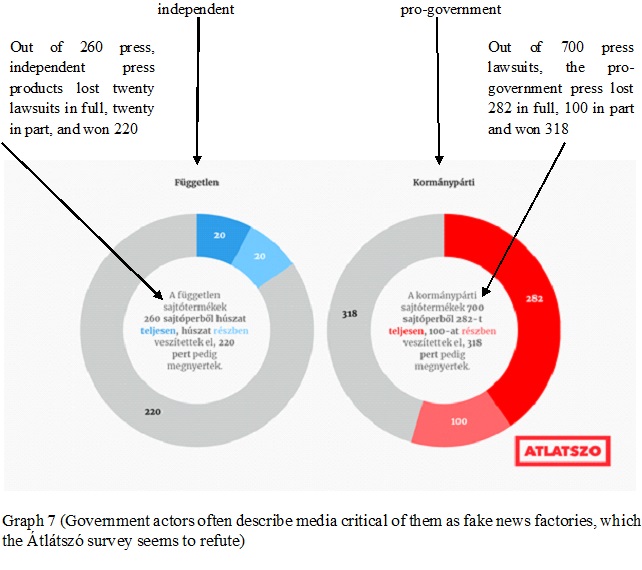
The mechanism of action of a political propaganda campaign can be most easily examined by measuring the prevalence of proven false staements, which have been refuted in public, among people sympathetic to different political tendencies. Eight statements were formulated, almost verbatim, based on the Brussels sanctions national consultation, and we also included statements that refuted the campaign's claims. We assumed that the rebuttals reached far fewer people than the main messages of the campaign, because the media decisions of the Orbán government have caused the information system to lose its inherent immunity, its ability to quickly correct fake news and disinformation.
The sanctions campaign is focused on the statement that Brussels is the cause of it all: the rise in prices, the loss of EU funds, the prolongation of the war, and the hundreds of thousands, even more than a million, of national consultation summaries pointing in one direction will suffice to reach this conclusion. The government is spending billions on this, the arsenal of political propaganda campaigns, the media close to the government, the bomb posters, the video clips, as stated coordinated by Fidesz’ Members of Parliament and of the European Parliament.
The survey results show that those who support the coalition government got the message. 86 percent of those surveyed had encountered the message and 79 percent considered the statement to be true. However, a political propaganda campaign is only really effective if it can convince at least a large part of the masses critical of the government of its truth, even though the original statement has been refuted many times in many media on the left. 77 per cent of Common List supporters have encountered the claim, and 36 per cent believe it to be true despite everything. In the camp of supporters of Mi Hazánk, the two figures are 77 percent and 44 percent. Not incidentally, among those without a party, 69 percent met the statement and 45 percent consider it true.
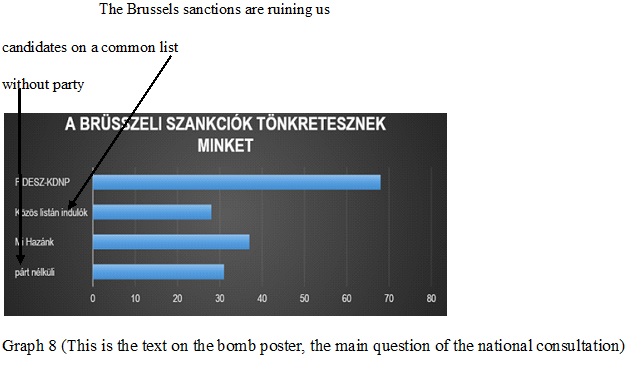
What was also clear from the spring survey was that almost a third of the coalition list accepted Fidesz's disinformation messages as facts. This figure is still close to 30% of the total population, which is high even though many people were not informed about the campaign's message and could not have taken it as true. Of particular note is the fact that among those who do not identify with either political party, 32% considered the statement to be true. The effectiveness of the political propaganda campaign machine is demonstrated by the fact that the proportions are almost identical for economic issues (some external cause is responsible for the poor state of the Hungarian economy).
A much more expensive study could perhaps reveal, for example, the role of the spectacular fall in the Orbán-Putin distance in the forint's depreciation, which, experts say, largely explains the government's significantly eroded international credibility.
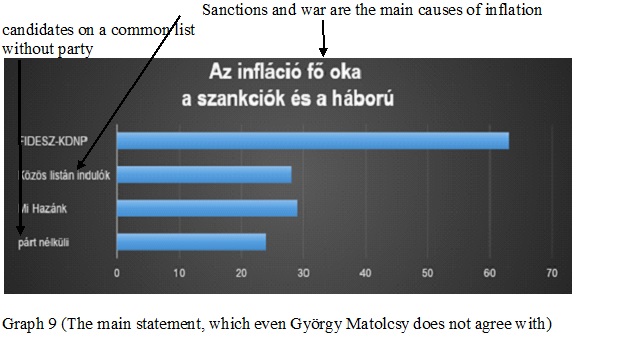
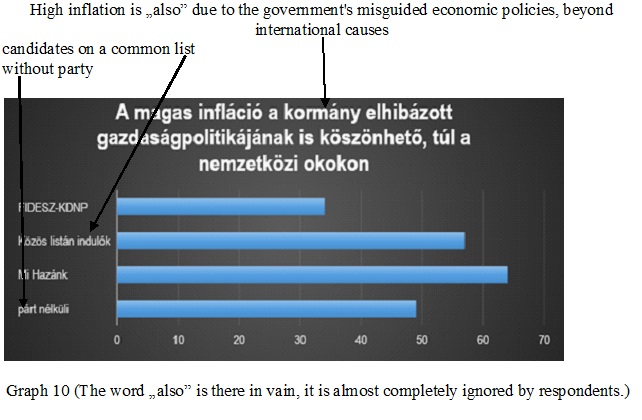
The complete board together:
1. The Brussels sanctions are ruining us.
2. Sanctions and war are the main causes of inflation in Hungary.
3. Hungary voted for all European sanctions against Russia
4. Sanctions do more harm to the European Union than to Russia
5. European sanctions are seriously affecting the Russian economy
6. Food prices in Hungary have risen much more than in neighbouring countries
7. The war is really a power struggle between Russia and America
8. Hungary's exceptionally high inflation is due not only to global economic trends but also to the government's misguided economic policies
The first column, in the order of the statements reported (To fit on the page
Middle column: Believed true, of those who encountered the news, %
Third column, Believed to be true (as a percentage of the total population, %)
|
All respondents |
Fidesz-KDNP |
Candidates on the 2022 common list |
||||||
|
met with it |
consider it true |
consider it true (total) |
met with it |
consider it true |
consider it true (total) |
met with it |
consider it true |
consider it true (total) |
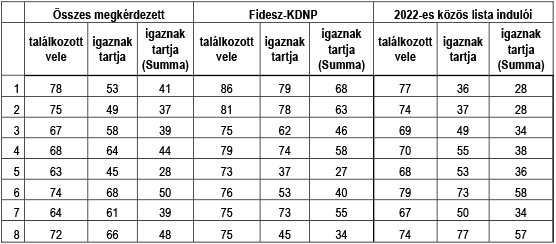
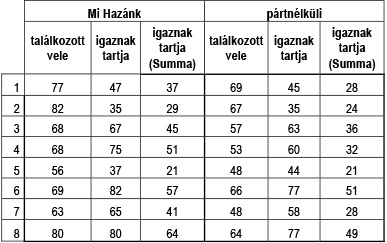
To check the data, it was also worth asking the questions in the reverse direction. In this way it became really visible how much the multi-faceted information is overwritten by the statements of the political propaganda campaign. The basic statement (based on the national consultation) was that the main causes of inflation were sanctions and war. Eighty-one percent of Fidesz-KDNP supporters encountered the message, and of those, 78 percent considered the claim to be true, compared to 74-37, 82-35 and 67-35 for the others. Even though we made the completely open-ended claim that the government might be to blame, the political propaganda mechanism works so well that a significant proportion of respondents ruled out government responsibility. The exceptionally high inflation in Hungary is due not only to global economic developments but also to the government's misguided economic policies. 75 percent of Fidesz-KDNP supporters have come across this statement, and 45 percent believe it to be true - that the government is also responsible for this. There is the word „also” in the statement, which means that if all Fidesz voters had answered that they thought the statement was true, they would have said that the government is also responsible... Just like everyone else also. At least as extraordinary is the fact that only 74% of the supporters of the joint list have encountered the statement, but 77% of them consider it to be true. 80-80, 64-77 are the number pairs for those affiliated with Mi Hazánk and those not affiliated with political parties. In other words, almost a quarter of those on the left also rule out any responsibility for the government.
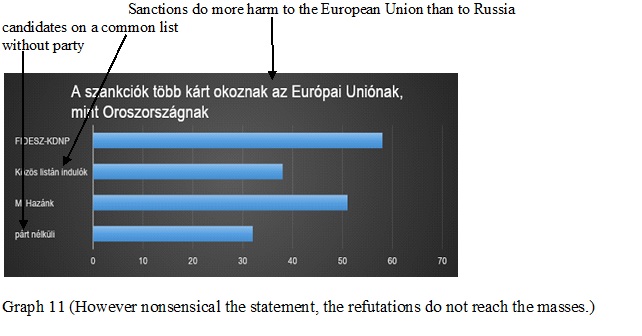
Criticising the sanctions policy, leading Fidesz politicians have been most vocal in public about the fact that the sanctions are doing more harm to the European Union than to Russia. The proportion of those in the opposition camp who believe the claim to be true reached 55 percent of those who had heard it (70 percent), although rebuttals were plentiful. Media close to the government were, of course, silent on studies that refuted the claim. Nor did they report on those that supported the view that the sanctions were seriously affecting the Russian economy.
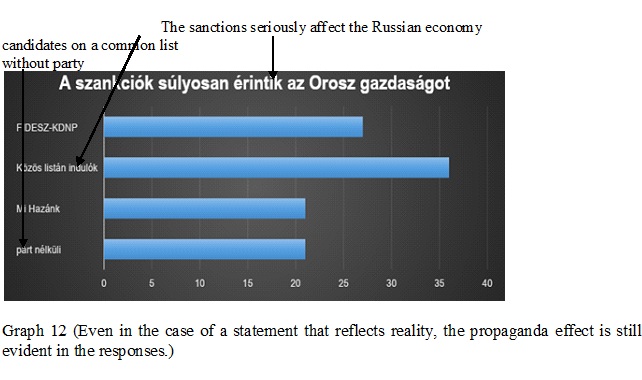
So we asked the question to see how effective the propaganda is. 73 percent of Fidesz-KDNP supporters had encountered the statement, but only 37 percent thought it was true. The figure was 68-53 among supporters of the joint list, 56-37, 48-44 among supporters of Mi Hazánk and those without a party. In other words, not even half of left-wingers believed what the independent papers wrote, and less than half of those not interested in public life think the sanctions make sense. Only a quarter of consumers of media close to Fidesz had encountered articles with such content, and only a quarter of that camp had overruled the narrative that political propaganda was trying to persuade them to follow.
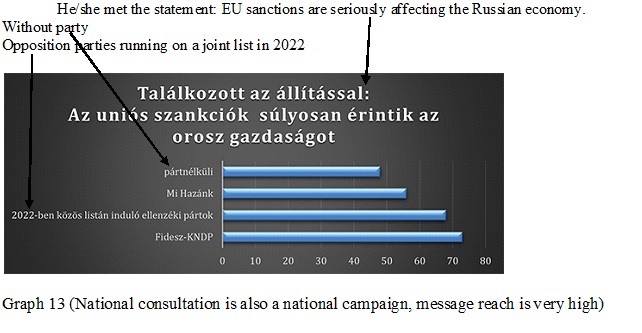
It is as if, despite the large number of objective reports in the independent media about, for example, industries being forced to shut down in Russia due to a shortage of chips and other important components, and even district heating in several cities being blocked due to restrictions on the import of pumps, only 36% of consumers of left-wing media believe that the Russian economy is suffering from the sanctions.
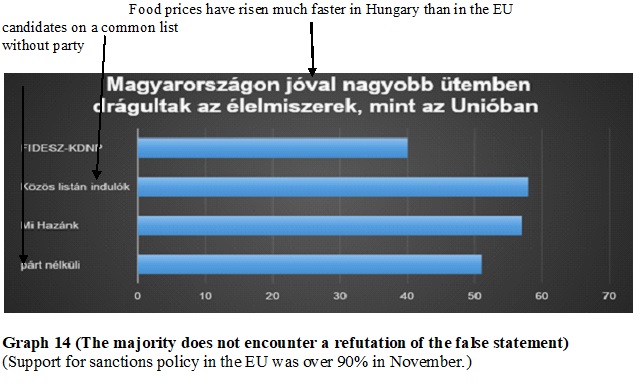
War inflation - we heard it often during the campaign. The "persuasion" worked, regardless of the fact that we do not need to import foodstuffs that could not leave Ukraine's ports because of the war. Moreover, inflation started much earlier than the war. The most recent EU statistics on 25 November showed that food prices in Hungary had risen by more than 40% in a year, while the EU average was less than 20%. Sixty-three percent of Fidesz-KDNP supporters believe that sanctions and war are the cause of inflation. But 28 percent of the community critical of the government also accept the government narrative.
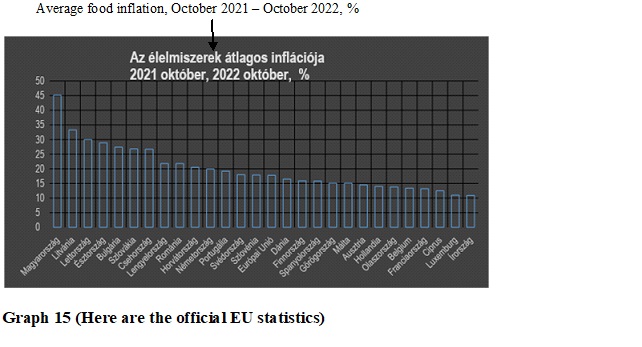
America got its fair share in the campaign. One of the reasons for this may be that the US government regularly criticises Hungary's particular interpretation of democracy and the rule of law, the state of press freedom and the regulation of LGBTQ issues. Putin has a vested interest in raising Russia to the level where it can negotiate with the US as an equal on the international stage. Since the outbreak of the war, Putin has often said that Russia's security was threatened by America's hushing up of NATO expansion, which is why the Ukrainians' dream of NATO had to be crushed before its time. The Fidesz narrative is represented by the statement that the war is really a power struggle between Russia and America, which is 73% true according to Fidesz media consumers. What seems to prove the effectiveness of the political propaganda, however, is that half of the media consumers, mostly critical of the government, who are sympathetic to the 2022 joint election list, hold a similar view, if we take those who have encountered the claim.
The Political Propaganda Indicator is a ratio that shows the extent to which, by strengthening disinformation mechanisms, transforming the media system, and limiting the opportunities for balanced, impartial, independent, objective and diverse information, the views of supporters of any political tendency can be diverted from those of a position in a manipulation-free environment - in a cultural and political community, a nation, a country. In authoritarian regimes, authoritarianism, etc., political propaganda is an indispensable tool for maintaining power.
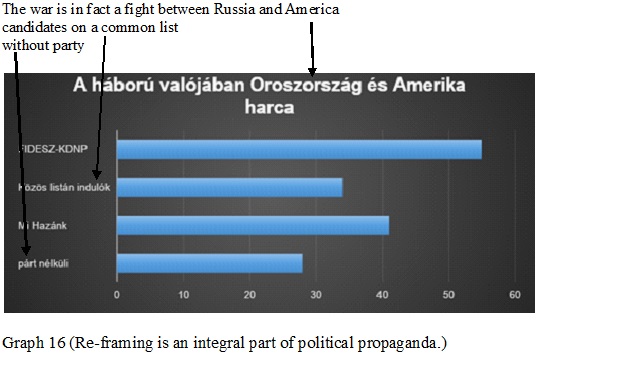
In the second week of November 2022, Závecz Research also asked people in a representative survey of 1,000 people whether they think things are going in the right direction. They found that public sentiment has deteriorated significantly since the spring. In May, 52 percent of people felt that things were going badly in their country, but by September this had risen to 62 percent and the rise has continued: the proportion of negative opinions is now 71 percent. In other words, political propaganda messages are succeeding in shaping voters' opinions in a public mood when, normally, they would have little chance of doing so. However, in the absence of an alternative, the majority accepts the information base that operates with the efficiency of the Popular-radio, as it hardly encounters any real data, any alternative to choose from. They are aware that the situation is very bad, but they are not getting the messages that would help them to understand that it is not the Hungarians who are the worst off in these times of crisis, but the government's serious mistakes that have led to this dramatic situation. And the government is successfully pointing the finger at Brussels.
We expected something similar, so we also asked what percentage of people accept even surprising statements by politicians without much scrutiny. In a colloquial turn of phrase, how much can Hungarians be led by any harsh words from politicians? Essentially, there is no meaningful difference between the answers. According to supporters of Fidesz-KDNP and Mi Hazánk, the average is 5.5 out of 10 people, according to supporters of the joint list 5.3, and 5.7 for non-party supporters.
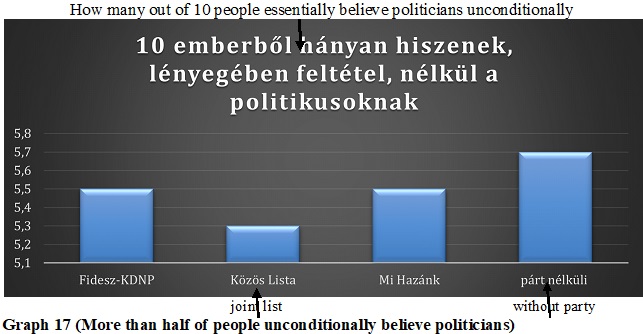
There is a war going on next door. There is no longer any debate about who is bombing whom. On the Ukrainian side of the statista website, the number of casualties on 20 November was 6,595, with 10,189 injured.13 We asked how much the respondent condemned Russia for its role in the war in Ukraine. There were six options to choose from: no condemnation at all, full condemnation, and no condemnation. 62 per cent of Fidesz-KDNP supporters do not condemn it at all and 18 per cent who condemn it completely. Among the joint list of supporters, 2 percent do not condemn and 29 percent completely condemn. The figure is 2-24 for Mi Hazánk and 3-36 for those without a party.
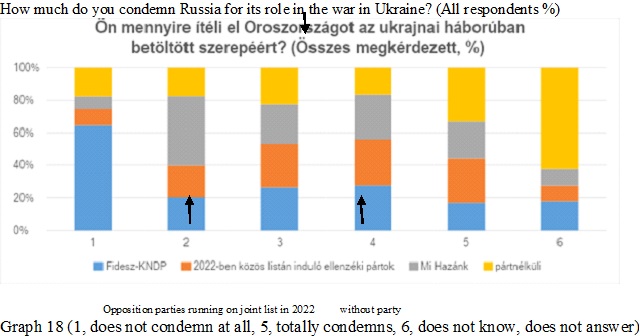
There is no control measurement, but it would be really justified to do something like this, because then we would really see how distorted the Hungarian information system is, and it would become clear that Hungarians are certainly no more insensitive people than citizens of any other European nation - if the right of access to information free from manipulation can be asserted.
As EU citizens, they deserve it too. That is why the EU cannot watch passively such a serious violation of a fundamental right.
1 https://www.youtube.com/watch?v=-DDCabdT8Kc
2 2022.11.18 https://www.politicalcapital.hu/hireink.php?article_read=1&article_id=3112
4 https://hvg.hu/360/202215_a_dezinformacio_akampanyban_allami_torzitas
5 https://www.politicalcapital.hu/podcast.php?id=56
7 https://www.napi.hu/nemzetkozi-vallalatok/gazprom-gazaremeles-energia-foldgaz.735048.html
9 https://hu.euronews.com/2022/10/28/ujabb-ket-tanulmany-erositi-meg-hogy-a-szankciok-mukodnek
10 https://mozgovilag.hu/2022/10/06/sik-endre-egy-hungarikum-a-moralispanik-gomb/
11 https://21.szazadkiado.hu/fasiszta-hazugsagok-federico-finchelstein
13 https://www.statista.com/statistics/1293492/ukraine-war-casualties/

